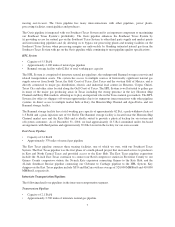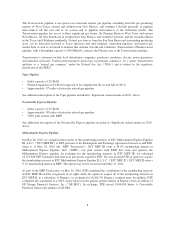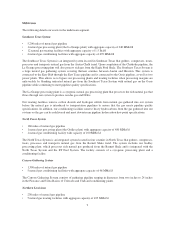Energy Transfer 2010 Annual Report Download - page 19
Download and view the complete annual report
Please find page 19 of the 2010 Energy Transfer annual report below. You can navigate through the pages in the report by either clicking on the pages listed below, or by using the keyword search tool below to find specific information within the annual report.
Historically, apart from pipeline safety, Louisiana has not acted to exercise this jurisdiction respecting gathering
facilities. In Louisiana, our Chalkley System is regulated as an intrastate transporter, and the Louisiana Office of
Conservation has determined that our Whiskey Bay System is a gathering system.
We are subject to state ratable take and common purchaser statutes in all of the states in which we operate. The
ratable take statutes generally require gatherers to take, without undue discrimination, natural gas production that
may be tendered to the gatherer for handling. Similarly, common purchaser statutes generally require gatherers to
purchase without undue discrimination as to source of supply or producer. These statutes are designed to prohibit
discrimination in favor of one producer over another producer or one source of supply over another source of
supply. These statutes have the effect of restricting the right of an owner of gathering facilities to decide with
whom it contracts to purchase or transport natural gas.
Natural gas gathering may receive greater regulatory scrutiny at both the state and federal levels. For example,
the TRRC has approved changes to its regulations governing transportation and gathering services performed by
intrastate pipelines and gatherers, which prohibit such entities from unduly discriminating in favor of their
affiliates. Many of the producing states have adopted some form of complaint-based regulation that generally
allows natural gas producers and shippers to file complaints with state regulators in an effort to resolve
grievances relating to natural gas gathering access and rate discrimination allegations. Our gathering operations
could be adversely affected should they be subject in the future to the application of additional or different state
or federal regulation of rates and services. Our gathering operations also may be or become subject to safety and
operational regulations relating to the design, installation, testing, construction, operation, replacement and
management of gathering facilities. Additional rules and legislation pertaining to these matters are considered or
adopted from time to time. We cannot predict what effect, if any, such changes might have on our operations, but
the industry could be required to incur additional capital expenditures and increased costs depending on future
legislative and regulatory changes.
Pipeline Safety. Our pipeline operations are subject to regulation by the U.S. Department of Transportation
(“DOT”), under the PHMSA, pursuant to which the PHMSA has established requirements relating to the design,
installation, testing, construction, operation, replacement and management of pipeline facilities. In addition, the
states in which we conduct operations administer federal pipeline safety standards under the Natural Gas Pipeline
Safety Act of 1968, as amended (the “NGPSA”), which requires certain pipelines to comply with safety
standards in constructing and operating the pipelines and subjects the pipelines to regular inspections. Failure to
comply with the safety laws and regulations may result in the imposition of administrative, civil and criminal
remedies. The “rural gathering exemption” under the NGPSA presently exempts substantial portions of our
gathering facilities from jurisdiction under the NGPSA, but does not apply to our intrastate natural gas pipelines.
The portions of our facilities that are exempt include those portions located outside of cities, towns or any area
designated as residential or commercial, such as a subdivision or shopping center. Changes to federal pipeline
safety laws and regulations are being considered by Congress and the DOT including changes to the “rural
gathering exemption,” which, may be restricted in the future. Other safety regulations may be made more
stringent and penalties could be increased. Such legislative and regulatory changes could have a material effect
on our operations and costs of transportation service.
Retail Propane Segment
Industry Overview
Propane, a by-product of natural gas processing and petroleum refining, is a clean-burning energy source
recognized for its transportability and ease of use relative to alternative forms of stand-alone energy sources.
Retail propane use falls into three broad categories: (1) residential applications, (2) industrial, commercial and
agricultural applications and (3) other retail applications, including motor fuel sales. In our wholesale operations,
we sell propane principally to governmental agencies and industrial end-users.
Propane is extracted from natural gas at processing plants or separated from crude oil during the refining process.
Propane is normally transported and stored in a liquid state under moderate pressure or refrigeration for ease of
17
























